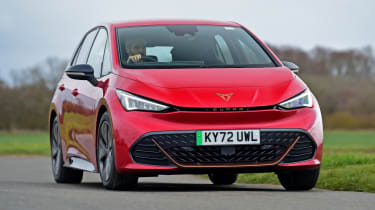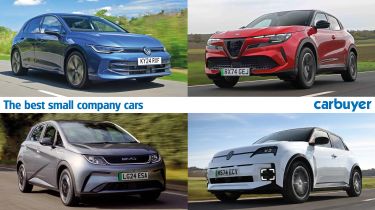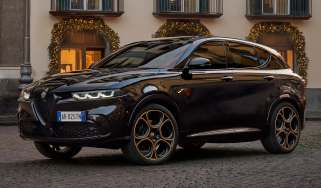Cupra Born review – a good-value and fun electric hatchback


Work perks don’t get much better than a company car, but not everyone needs something as big as an SUV or even a saloon car. Not only will a small company car save space, it could save you cash too – a lower purchase price often translates to a smaller Benefit-in-Kind tax bill for the driver.
The Benefit-in-Kind (BiK) company car tax system incentivises drivers to choose low-emissions models, with electric cars falling into the lowest 2% BiK band. This results in a much smaller annual bill than their petrol and hybrid rivals, so we’d recommend going for an EV if you can make it work with your lifestyle.
For that reason, many of the cars on this list are electric as their value for money is hard to beat. However, electric cars don’t suit everyone’s driving habits, so we have included some hybrid cars, too.
Our comprehensive guide to the BiK company car tax system covers everything you need to know about leasing a company car and how much it’ll cost you.
Below we have listed the best small company cars but if size isn’t a priority for you, you can read our more general list of the best company cars. We have also covered the top 10 best small cars if you’d like a broader overview of the current small car market.
We’ve also included the annual BiK payment for each model, but beware that this will increase from April 2025.
Three-time winner of the Best Small Car category at our annual Car of the Year Awards, the Cupra Born rightfully sits at the top of this list. Based on the Volkswagen ID.3, the all-electric Born outshines its German twin in practically every area without costing a great deal more. It’s good to drive, has all the standard equipment you could need, and is styled with just the right balance of flair and subtlety.
Standard cars come with a 58kWh battery capable of up to 264 miles which should satisfy most drivers’ needs. If you plan to use your company car for big motorway miles, there’s a larger 77kWh battery – good for around 340 miles. A rapid charger will top up the battery from 0-80% in roughly 35 minutes, which isn’t too far off a Tesla Model 3.
At just over 4,300mm long, it’s not the tiniest car on this list, but interior and boot space benefit as a result. Opting for the larger battery drops the Born from five seats to four, so it’s worth considering whether range or passenger capacity is more important to you.
Starting at just over £36,000, and benefitting from the lowest 2% BiK rate, the Cupra Born ticks all the small company car boxes and won’t cost a fortune either.
| Pros | Cons |
|
|
Find the latest new and used Cupra Born deals on our sister site Auto Express
You’re unlikely to find a more affordable company car than the electric Citroen e-C3. Costing from just £22,000, it’s one of the cheapest electric cars on sale today, which will translate to a rock bottom BiK bill for company car drivers. Cheap doesn’t mean compromised though – the e-C3 is a great supermini and our Best Small Electric Car award winner for 2025.
The e-C3 gets a relatively small 44kWh battery, giving it enough juice for nearly 200 miles of range. During our testing across a mixture of different roads, it returned around 175 miles, which will be plenty for many drivers. Its 100kW maximum charging speed isn’t particularly impressive on paper, but the small battery means that a 10 to 80% top up should take less than half an hour.
The e-C3 feels most at home around town, with its small size lending itself to tight urban streets and cramped car parks. The soft suspension does well to iron out rough roads, plus the memory foam seats add another layer of comfort. Head out onto the motorway and the e-C3 doesn’t feel out of its depth. The 111bhp motor has enough grunt to make overtaking a breeze, but there was a noticeable amount of wind noise at higher speeds.
| Pros | Cons |
|
|
Find the latest new and used Citroen e-C3 deals on our sister site Auto Express
If you’re not prepared to make the switch to battery-power for your next company car, then a hybrid is likely to be your best bet – their low CO2 emissions figures will save you money compared to a regular petrol car. Out of the small hybrid cars on the market, the Renault Clio E-Tech is one of the best.
Inside the Clio, you’re greeted by a surprisingly premium interior, equipped with plenty of tech and excellent materials. It’s comfortable on the motorway but really shines around town – the hybrid system is smooth, quiet and capable of powering the car up to 40mph. Get onto a twisty B-road and the Clio is equally impressive, striking a well-judged balance between handling and ride quality.
The rear seats aren’t as spacious as some rivals, but the 301-litre boot is better than other hybrid superminis. A five-star NCAP safety rating tops off the Clio’s list of strengths, making it the hybrid hatchback to beat for company-car drivers.
| Pros | Cons |
|
|
Find the latest new and used Renault Clio deals on our sister site Auto Express
Outright winner of last year’s Carbuyer Car of the Year award, the BYD Dolphin should be on any small-car buyer’s shortlist, company car or not. With a focus on affordability, the Chinese electric supermini undercuts many models from more established brands, while still delivering impressive range and interior tech.
The Dolphin falls between the Ford Fiesta and Focus in terms of size, but the interior is more spacious than both, with excellent rear passenger legroom and a respectable 345-litre boot. Every model comes with a rotating, 12.8-inch infotainment touchscreen plus a small digital display behind the steering wheel. The general cabin design won’t appeal to everyone, but it’s hard to argue against the fit and finish of the Dolphin considering it starts from just over £26,000.
That affordable price, combined with the electric car 2% BiK rating, makes the Dolphin an excellent value proposition for company car drivers.
| Pros | Cons |
|
|
Find the latest new and used BYD Dolphin deals on our sister site Auto Express
The Volkswagen Golf has long been a great company car option for drivers wanting something on the smaller side. It’s still an excellent, well-rounded hatchback, offering practicality, quality and driving enjoyment in equal measures, but a new plug-in hybrid engine could be the winning ticket for those looking to cut their BiK bills.
The Golf eHybrid pairs a 1.5-litre petrol engine with an electric motor and giant 20kWh battery, resulting in a frankly absurd fuel economy figure of 1,000mpg. Ok, you’re unlikely to hit that number unless you spend 90% of your time in electric-only mode, but that might be possible for some drivers thanks to the Golf’s 88-mile electric range. Importantly for company car drivers, the Golf eHybrid falls into the 5% BiK band, making it a very affordable option.
The Golf has the upmarket look and feel that will appeal to company car drivers, while it’s also cemented itself as a reliable family workhorse. The hybrid system does eat into boot space, but it’s still as practical as it’s always been. One area we’re less keen on is the fiddly infotainment system, but a mid-life update in 2024 did bring some minor improvements.
| Pros | Cons |
|
|
Find the latest new and used Volkswagen Golf deals on our sister site Auto Express
Is there a more stylish small car on sale today? We’re struggling to think of one, which goes to show just how right Renault got the design of the new 5. It’s more than just a pretty face, though – the 5 is a very capable small electric car that’s great to drive and refreshingly affordable. We think it makes an excellent choice for company car buyers looking for low BiK payments and a bit of style.
Under the retro-futuristic bodywork, the Renault 5 gets a 40kWh battery as standard, good for 193 miles of range. While that will be enough for drivers who mainly stick to urban driving, some business drivers might want to upgrade to the bigger 52kWh battery with its 249-mile range. Sure, an electric MINI Cooper can do the same, but the Renault rides far better and is just as fun to drive. For even more performance, there’s always the Alpine A290, which is essentially a hotted-up 5 from Renault’s sporty sister brand.
| Pros | Cons |
|
|
Find the latest new and used Renault 5 deals on our sister site Auto Express
The Honda Jazz may not be the last word in style or fun handling, but where it does stand out is its overall usability. Its small, boxy proportions provide bags of interior space, and the cabin is also surprisingly stylish. Slightly sparse entry-level models aside, the equipment levels on the Jazz are pretty generous, too.
Being an automatic-only hybrid car, the Honda Jazz is also easy to drive and handily economical around town, which will be music to the ears for drivers with urban commutes. With emissions from 102g/km to 110g/km, the Honda Jazz’s Benefit-in-Kind rates vary from 25% to 27%, which are fairly good when compared to other superminis and will help reduce the amount you’ll pay in company car tax.
| Pros | Cons |
|
|
Find the latest new and used Honda Jazz deals on our sister site Auto Express
The Junior is Alfa Romeo’s first electric car, and there’s a lot to like as far as debut efforts go. It has all the style we’ve come to expect from the iconic Italian brand, a solid underlying EV platform, and an upmarket interior that makes it a solid choice for company car drivers. It’s pretty affordable, too, costing from around £34,000 in its entry-level guise, which will help keep those BiK payments low.
The Alfa Romeo Junior may be one of the bigger cars on this list, but it’s still a relatively compact small SUV that’s easy to manoeuvre around town. Being an SUV, you get a handy raised ride height that can improve visibility and make getting in and out that little bit easier. Practicality is a strong point, too, thanks to its respectable 400-litre boot and spacious rear seats.
The Junior’s range figures aren’t the most impressive on paper. The entry-level Elettrica can manage 255 miles from its 54kWh pack, while the speedy Veloce model only achieves 208 miles. Charging speeds leave something to be desired, too, but the Junior excels in other areas. It’s one of the best cars in its class to drive, with excellent balance and a well-sorted ride. There’s a mild hybrid petrol version on the way, but this will inflate your BiK payments significantly, so it’s probably not the best choice for company car drivers.
| Pros | Cons |
|
|
Find the latest new and used Alfa Romeo Junior deals on our sister site Auto Express
While many of the electric cars available now tend to be big and expensive, there are still options out there if you’d prefer something a bit smaller. For those looking for an electric supermini as their next company car, the Peugeot E-208 makes a tempting proposition – after all, it has the same stylish looks as the regular Peugeot 208, yet promises to be far more affordable to run.
Being fully electric, the Peugeot E-208 doesn’t emit any CO2, so its Benefit-in-Kind rate is at 2% rather than the 25% rate for the least-emitting combustion-engined Peugeot 208s. With a range of up to 225 miles, longer commutes and drives to business meetings shouldn’t be too tricky, and since there’s spec parity across the range, the Peugeot E-208 gets the same stylish cabin and good standard equipment levels as the conventionally powered versions.
| Pros | Cons |
|
|
Find the latest new and used Peugeot E-208 deals on our sister site Auto Express
For commuting in and around towns and cities, cars like the Toyota Yaris make a lot of sense. It’s small, manoeuvrable and easy to place accurately on the road and, while not exactly bristling with power, it’s peppy enough to keep up with traffic.
The Yaris comes as standard with a frugal hybrid system with either 114bhp or 129bhp. It's an automatic-only car, so there’s no need to deal with a clutch pedal in stop-start rush hour congestion. The standard equipment list is long and front passengers have plenty of space, but the Clio is both more interesting and roomy on the inside.
Being a hybrid, fuel economy is impressive (we achieved around 65mpg during our in-depth test), with that efficiency resulting in low CO2 emissions and a corresponding competitive Benefit-in-Kind rate of 22% for the entry-level model. That’s one band below the more expensive Clio, saving you some extra cash every month.
| Pros | Cons |
|
|
Find the latest new and used Toyota Yaris deals on our sister site Auto Express
The table below includes our 10 best small company cars, their starting price, Carbuyer score and BiK annual payment.
| Best small company car ranking | Make and model | Priced from | BiK annual payment at 20% | BiK annual payment at 40% | Carbuyer rating (out of 5) |
| 1 | Cupra Born | £35,000 | £142 | £284 | 4.3 |
| 2 | Citroen e-C3 | £22,000 | £88 | £175 | 4.2 |
| 3 | Renault Clio E-Tech | £22,000 | £1,031 | £2,062 | 4.4 |
| 4 | BYD Dolphin | £26,000 | £105 | £209 | 4.3 |
| 5 | Volkswagen Golf eHybrid | £36,000 | £361 | £722 | 4.1 |
| 6 | Renault 5 | £23,000 | £92 | £184 | 4.1 |
| 7 | Honda Jazz | £27,000 | £1,358 | £2,716 | 4.1 |
| 8 | Alfa Romeo Junior Elettrica | £34,000 | £135 | £271 | 4.1 |
| 9 | Peugeot E-208 | £30,000 | £120 | £239 | 4 |
| 10 | Toyota Yaris | £23,000 | £1,054 | £2,109 | 4 |
Read more about the most affordable electric cars on sale today



